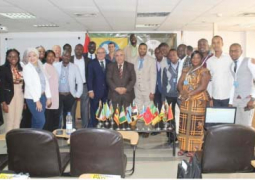Senegal's leader Abdoulaye Wade has already made clear his ambition to run for a third term in 2012. In an interview with Voice of America's French service, President Wade said if he lived long enough, he would stand as a presidential candidate in 2012. He said: "Nobody has the right to stop me from contesting. It is left for the Senegalese people to decide who they want. The game shall be open to all."
The question arising from the Wade comment is how he proposes to go about his third-term presidential ambition as Senegal's constitution allows only two terms for a president and Wade's second term runs out in 2012. Is he going to conduct a referendum? Tinker with the constitution? Impose himself on the Senegalese people somehow?
It is all déjà vu because it brings to mind the President Tandja example in the Republic of Niger. Before Tandja, the former Nigerian leader Olusegun Obasanjo had sought to perpetuate himself in power through tenure elongation. But the Nigerian people made him bite the dust. It is now endemic on the continent for incumbents to try one ruse or another to hang on to power. With Eyadema, the dynasty formula worked out well, just as it did for the late Bongo of Gabon. Wade himself had tried the same tack with his 40-year-old son Karim, but the bid failed.
It looks as if democracy as we know it is at a crossroads in Africa. The anti-democratic fervour is varied and contagious, making the fine example of Ghana where there have been three successive democratic transitions looks like an aberration. In Kenya and Zimbabwe, it is the power-sharing model that is at work, allowing power-drunk incumbents to rule by default. In Guinea Conakry, Guinea Bissau and Mauritania, the threat of a junta looms all the time.
In a democracy, the constitution is sacrosanct. The vision that gave force to the lives of the Founding Fathers of the American nation is enshrined in their foundational texts: the Declaration of Independence, the Constitution and the Gettysburg Address. And successive American leaders have been upholding the values espoused by these sacred documents. How inviolate and inviolate are the national constitutions of African nations when their leaders can temper with them as they see fit?
The story of President Wade is both shocking and worrying. Long before he became president, Wade had been a dominant opposition figure, who made both Leopold Sedar Senghore and Abdou Diouf have sleepless nights through his polemics, so much so that the Senegalese people decided to give him a chance in 2000. But his declared ambition is a sad commentary on the integrity of the opposition in Africa. It is as if when they are not in power, they posture themselves as angels and saints. But the moment they get power, they act worse than their predecessors.
We however urge President Abdoulaye Wade to reconsider his ambition on more counts than one. He is one of the architects of NEPAD, a formula designed to liberate the continent from retrogressive forces. Taking unconstitutional steps, as going for a third-term, is at variance with the spirit of NEPAD. Additionally, he is a respected elder statesman on the continent whose actions and utterance should be exemplary to much younger leaders. If he is seen to be breaking a tenet of good governance, younger African leaders with authoritarian inclinations will simply go berserk, thereby plunging the continent deeper into squalour and misery. It is ironical that President Wade declared his ambition at the occasion of the signing of the $540 million granted to Senegal by the Millennium Challenge Corporation that has good governance as one of its eligibility criteria.
He should also realize that Senegal's democratic credentials are matchless and exemplary: it is the only country in the sub region that has not been led by a junta. This is a distinction and heritage that Senegalese and democrats across the world cherish and want to see preserved. President Wade would be wise to stand down after his second terms in 2012. That is what the Senegalese constitution stipulates.
"Man's capacity for justice makes democracy possible, but man's inclination to justice makes democracy necessary".
Reinhold Niebuhr
Reinhold Niebuhr
Read Other Articles In Article (Archive)
Woman arraigned for alleged nurder
Mar 9, 2012, 1:56 PM



